
Illustration: Chen Xia/GT
The UK's
Queen Elizabeth carrier strike group on Sunday entered the South China Sea through the Strait of Malacca. It has not so far done anything particular that can attract the focus of public attention. The Washington Examiner, a US right-wing media outlet, on July 23 published an article which said, "The question of whether the 'special relationship' between Britain and the US is truly all that special… much depends on a 12-mile test in the South China Sea - more specifically, whether or not Prime Minister Boris Johnson sends a British warship within 12 miles of artificial Chinese territory." Earlier, the UK said Britain is not looking for a "confrontation." Instead, it is to "exercise its right to freedom of navigation," according to BBC.
The
Queen Elizabeth carrier strike group's navigation to the South China Sea was the UK's effort to show its presence in the region. We seriously warn this group: They are obliged to remain restrained and obey the rules. Please follow the current international shipping lanes and stay at least 12 nautical miles away from the Chinese islands and reefs.
US warships have repeatedly entered the 12 nautical miles of the Chinese islands illegally in the South China Sea. So far, China has remained restrained to the largest extent. Yet it does not mean we will tolerate such provocations in the long term, nor does it mean that US allies can learn from the dangerous posture of the US. China is likely to escalate its attempts to expel the warships at any time. In the future, stopping such intrusive behavior that violates China's territorial waters is a struggle China is destined to intensify.
We advise US allies to be particularly cautious, keep a sufficient distance from China's red lines, and refrain from pushing ahead. They must be bluntly told that if their warships rampantly behave as the US military does in the South China Sea, they will more likely become an example of China defending its sovereignty and territorial integrity - just as a popular Chinese phrase indicates: To execute one as a warning to a hundred.
Needless to say, China has been strengthening its military capabilities in the South China Sea. These do not only involve the deployment of warships to the region, but also systematic military preparations. The distance between hot-spot regions in the South China Sea and the Chinese mainland is ideal for the use of China's various mid-range missiles. It would be wrong if the US and its followers just count who has more aircraft carriers and fighters in the region. Those aircraft carriers would be very vulnerable to extreme military conflicts.
The South China Sea is an international maritime transport channel, and its freedom of navigation has historically been fully realized. Under international law, warships, including those of the US and its allies, have been able to pass through the South China Sea unimpeded. But if those ships want to exert geopolitical pressure and build a wall to contain China along those shipping lines, those warships will face a confrontation from China. And the intensity of the confrontation is bound to increase constantly.
The very idea of a British presence in the South China Sea is dangerous. We respect the right of passage in the South China Sea granted by international law to military forces of all countries, including the UK.
However, if London tries to establish a military presence in the region with geopolitical significance, it will only disrupt the status quo in the region. And the UK simply does not have the ability to reshape the pattern in the South China Sea. To be precise, if the UK wants to play the role of bullying China in the region, it is demeaning itself. And if there is any real action against China, it is looking for a defeat.
We should also give such advice to Australia and Japan. For the international community, first of all, there is a shipping lane in the South China Sea. And then there are territorial disputes between different regional countries. As for disputes, China and other countries in the region are working to reach a Code of Conduct in the South China Sea to peacefully resolve or effectively manage those differences. In short, that is a matter between regional countries. Countries outside the region should only use the lane, instead of initiatively engaging in disputes.
The US wants to "play a role" in the South China Sea, which shows its hegemony and has made the region a new front line of the contest between great powers. Here in the South China Sea, China will end the struggle between hegemony and anti-hegemony forces with the US. All other countries outside the region are advised to stay away from this confrontation to avoid "accidental injury."




